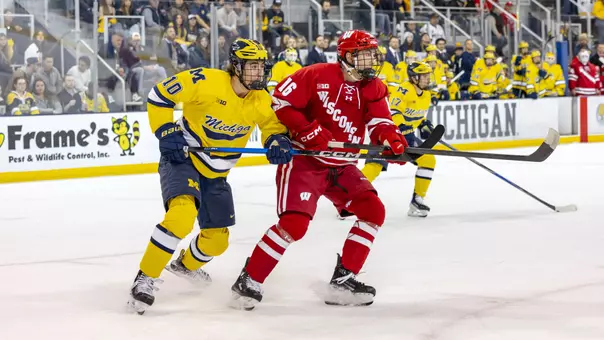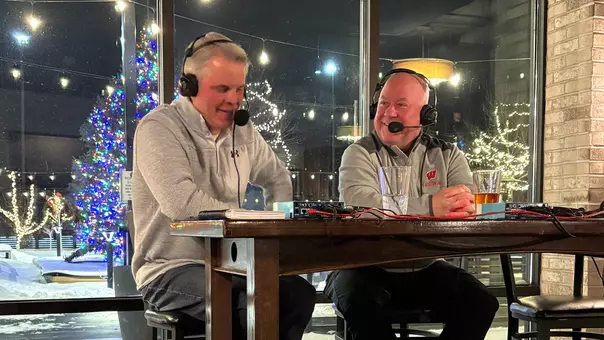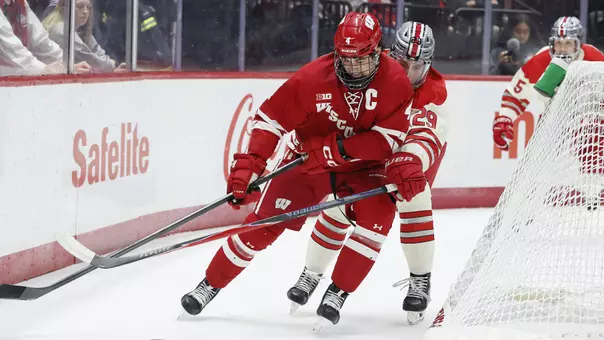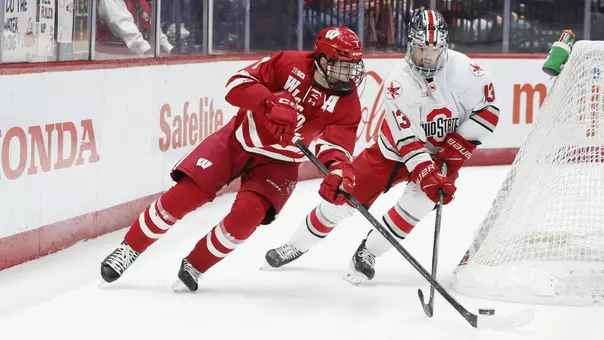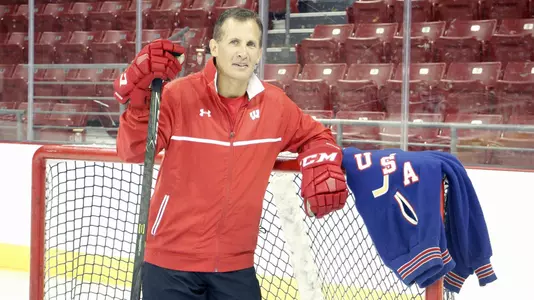
Baggot: Granato’s inclusion in U.S. Hockey Hall of Fame well deserved
December 08, 2020 | Men's Hockey, Andy Baggot
Hall of famers Chelios, Richter, Suter and Johnson applaud fellow Badger’s honor
 |
|
|
BY ANDY BAGGOT
UWBadgers.com Insider
MADISON, Wis. — It was described by one NHL executive as the greatest gathering of American hockey talent in history.
This was the fall of 1991 and Team USA was gearing up to play in the prestigious six-nation Canada Cup, its 23-person roster laden with future all-stars, award-winners, record-setters and Stanley Cup heroes.
Nearly two-thirds of that club played college hockey, including four close friends from Wisconsin: Defenseman Chris Chelios, winger Tony Granato, goaltender Mike Richter and defenseman Gary Suter.
The Americans would advance to the final before losing to Canada, but Chelios, Granato, Richter and Suter were seen as significant contributors who had a lot in common beyond their links to the Badgers.
All four wound up being Olympians: Chelios in 1984, '98, 2002 and '06; Granato in 1988; Richter in 1988, '98 and 2002; and Suter in 1998 and 2002.

All four received major NHL awards during their careers: Chelios won the Norris Trophy in 1989, '93 and '96 as the best defenseman; Granato was given the Bill Masterton Trophy in 1997 for perseverance and sportsmanship; Richter won the Lester Patrick Trophy in 2009 for outstanding service to hockey in the United States; and Suter earned the Calder Trophy as the top rookie in 1986.
All four played in the Stanley Cup Final during their time as players: Chelios won titles in 1986 with Montreal and 2002 and '08 with Detroit; Richter won it all with the New York Rangers in 1994; Suter prevailed with Calgary in 1989; and Granato finished as the runner-up with Los Angeles in 1993.
All four were recruited to Madison to play for Wisconsin by the legendary Bob Johnson, who happened to be named Team USA coach for that memorable Canada Cup series. Johnson would spend the tournament in the hospital prior to passing away that November.
All four were viewed as elite talents in part because of their participation in that international tournament: Chelios and Granato were among the top scorers for Team USA, Suter was an impactful defensive presence, while Richter was the starting goaltender.
"To me, playing in the Canada Cup was a step above playing in the NHL because all the best players were there," Suter said of rosters that included the likes of Wayne Gretzky (Canada), Nicklas Lidstrom (Sweden), Sergei Fedorov (Russia), Teemu Selanne (Finland) and Jaromir Jagr (Czechoslovakia).
"Every one of those guys loved playing the game and were so proud of wearing the U.S. sweater," Richter said of his fellow Wisconsin alums involved in that tournament. "It's a cool connection to be a part of."
Word came in September of 2020 that Chelios, Granato, Richter and Suter now share another slice of honorable notoriety. Granato was named to the latest class of inductees to the U.S. Hockey Hall of Fame, joining Chelios and Suter, who were enshrined in 2011, and Richter, who was so honored in 2008.
Chelios, who played an NHL record-tying 26 seasons and is regarded by many as the best American-born product ever, got an up-close look at Granato during that Canada Cup experience and came to some apt, career-defining conclusions.
One was Granato's presence.
"His teammates loved him," Chelios said.
Another was Granato's diligence.
"Ninety-percent of the battle for success is just hard work and that's Tony," Chelios said. "I don't think he was the most gifted or skilled player, but he made up for it with his work ethic."
It's appropriate that Granato, the men's coach at Wisconsin since 2016, will go into the hall as part of a college-centric class. Dean Blais won two NCAA men's titles as the head coach at North Dakota. Jenny Potter was a four-time Olympian on the women's side who won an NCAA crown at Minnesota Duluth. Jerry York has won five NCAA men's championships at Bowling Green (one) and Boston College (four) on the way to becoming the winningest coach in Division I history.
Granato starred for the Badgers from 1983 to '87, becoming one of two players in program history to surpass 100 goals and 100 assists.
Granato spent 13 seasons in the NHL as a player with the New York Rangers, Los Angeles and San Jose, amassing 248 goals, 244 assists and 492 points in 773 career games. He was an all-rookie selection in 1989 and an All-Star Game participant in 1997.
He spent another 13 seasons coaching in the NHL — three as a head coach in Colorado and a combined 10 as an assistant with Pittsburgh and Detroit — and had two stints with Team USA in the Olympics. He was an assistant coach in 2014 and the head coach in 2018.

"I don't think when something like this happens it's about us," Granato said of the inductees. "I think it's about all the people that have given us an opportunity to do what that we love to do every single day of our lives."
For Granato, that list begins with his parents, Don and Natalie, of Downers Grove, Illinois, who raised a family of six with a heavy emphasis on hockey.
"We did hockey (for) breakfast, we did hockey post-school, we did hockey when we went to our bedroom, we did hockey in the summer, winter, spring or fall," Tony said. "My parents gave us that opportunity. Hockey has been a part of our lives every day since we can remember as a kid."
That helps explain why Granato's younger brothers, Don Jr. and Rob, followed him to Wisconsin; why Don Jr. is an NHL head coach with Buffalo; why younger sister Cammi, currently a ground-breaking NHL scout with Seattle, is one of the greatest American players in history regardless of gender.
In 2008, Cammi was the first woman inducted in the U.S. Hockey Hall of Fame. In 2010, she was among the first women enshrined in the International Hockey Hall of Fame.
Chelios, an International Hockey Hall of Famer, served as one of Granato's assistants during the Winter Olympics in 2018. What did he learn about his friend in that first-time setting?
"He's stubborn for sure," Chelios said with a laugh. "But he gets the most out of his players because they have so much respect for him because he has so much respect for them. He played. He knows their game.
"When you're facing adversity, he handles it much better than I sure did. Coaching can be frustrating, but Tony's positive all the time."
Richter and Granato were roommates in college and both were taken in the NHL draft by the Rangers. Richter said Granato's Hall of Fame worthiness is defined by "the intensity of his play and the quality of his play on the ice" and "the integrity of him as a person."
"There was never a bad day to be at the rink with Tony," Richter said. "That dude loved a challenge as much as anybody I've ever met and competed with everything he had."
Suter, who was in the same Wisconsin recruiting class as Granato in 1983, said his friend's resume represents a "double-edged sword" for Hall of Fame inclusion.
"It kind of speaks for itself at all levels," Suter said. "Not only has he been a great player in the league for an American hockey player, he's also been a builder as well."
Like countless peers, Granato was inspired by the Miracle on Ice in 1980 and longed for the day he might play for his country. During a national Zoom call, Granato was asked for his favorite career memory. He spoke of the moment in 1983 when he was invited to play for Team USA in the World Junior Championships and donned the Red, White and Blue sweater for the very first time. He went looking for that keepsake and had a quiet moment of reflection when he located it.
"He represents every team and uniform he wore so well," Richter said.
"He was just an amazing player. I played with him. I played against him. I've been around him plenty as a roommate and a teammate. He's the perfect example of what you want in your locker room, on the ice and your program to be about."
Wisconsin has the unique distinction of having both its men's and women's coaches inducted in the U.S. Hockey Hall of Fame. They, too have a lot in common.
Mark Johnson, enshrined in 2004, starred for the Badgers as a player, had a long, decorated NHL career and has since led the women's program to six NCAA titles. His Hall of Fame father recruited Granato, but left for the NHL before Granato got to Madison. Johnson was a standout on that gold-medal-winning Miracle team that inspired Granato so much in 1980. Johnson coached the U.S. women's team in the Olympics and once considered an offer from Granato to be his NHL assistant in Colorado.
Johnson and Granato also endured in the NHL despite being significantly undersized.
"He was feisty," Johnson said. "If you looked at the way he played, then get to know him and look at the size of him, you think, 'Wow, this is one tough dude.' Because he wasn't backing down from anybody."
Johnson said Granato's defining Hall of Fame credential is his selflessness when it comes to USA Hockey. If they needed players or coaches, regardless of the event's profile, Granato signed up.
"Anytime they ask him to do something, it was always yes," Johnson said. "No hesitation. It didn't matter what was going on.
"His willingness to do whatever he could do to help USA Hockey out in different capacities as a player, as a coach, as a mentor and do it for so long and have success doing it, to me is something that really stands out about him."
Richter recalled a conversation he once had with Steve Reed, a teacher and counselor at Northwood Prep in Lake Placid, New York, where Richter and Granato attended high school.
"He said, 'Tony just has this thing. I don't know quite what to call it, but it's the ability to say, "C'mon guys, we're going this way." Then everyone stands up and does it,'" Richter recounted.
It's one thing to talk about it. It's another to follow through.
"When he was leading somebody someplace," Richter said of his friend, "it was the right way to go."

